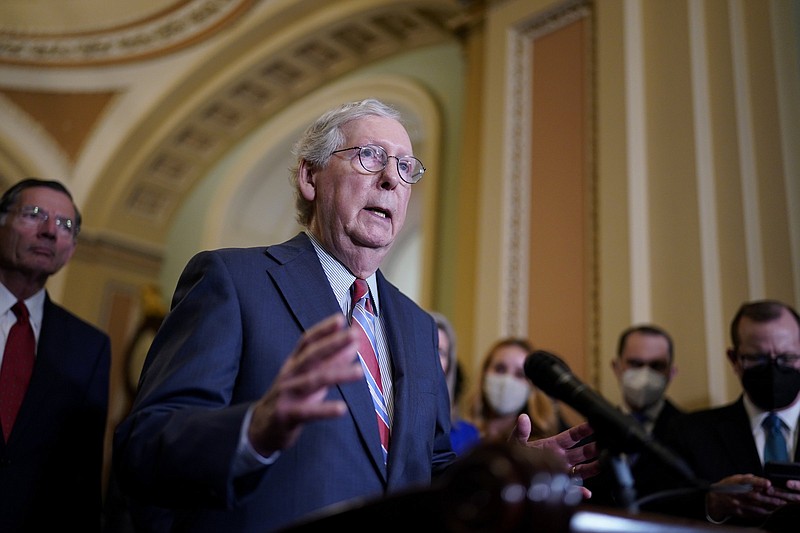WASHINGTON -- The Biden administration has been enlisting one emissary after another to persuade Senate Republican leader Mitch McConnell to help raise the federal debt limit.
It's not working.
Despite the high-level conversations, including a call from Treasury Secretary Janet Yellen, the GOP leader is digging in. He's telling all who will listen that it's up to the Democrats, who have narrow control of Congress, to take the unpopular vote over federal borrowing on their own.
McConnell's stance is deepening a political standoff and risking turbulence in the financial markets that could ripple into the broader economy. His refusal to rally Republican votes leaves Democrats with only tough choices as they rush to ensure the nation does not default on any of its accumulated debt, which now stands at $28.4 trillion.
President Joe Biden and the Democratic leaders, House Speaker Nancy Pelosi and Senate Majority Leader Charles Schumer, were set to speak Thursday afternoon. While there is little doubt the Democrats will be able to avert a crisis and vote to allow additional borrowing, the path ahead is uncertain and potentially treacherous.
"We are working, there are a number of different options," Schumer told reporters earlier this week at the Capitol. "We will do it because its imperative to do it. And Leader McConnell, as I said, is playing dangerous political games by not stepping up to the plate."
The showdown is sparking a fiscal battle that is reminiscent, but different, from those that have set Washington and Wall Street on edge at times over the past decade.
Unlike the brinksmanship of past battles, this one is unique in that there is no deal to be brokered -- McConnell simply will not participate. Late Wednesday, McConnell warned Yellen he is not changing his mind.
"The leader repeated to Secretary Yellen what he has said publicly since July," McConnell spokesman Doug Andres said. "They will have to raise the debt ceiling on their own and they have the tools to do it."
It was a similar situation Tuesday when Hank Paulson, who was Treasury secretary in the Bush administration, paid McConnell a visit at the Capitol. Other intermediaries have also reached out, according to a person familiar with the talks and granted anonymity to discuss them.
Lawmakers appear to have only a few weeks to devise a plan for approving the federal government's debt limit before the U.S. Treasury is forced to delay or miss payments. Stocks and bonds have been relatively calm recently, indicating investors expect Washington will ultimately reach a deal on the debt ceiling.
The S&P 500 remains within 2% of its record set two weeks ago, and prices in the bond market are moving more on reports about the economy and inflation. But the ride could get bumpier in coming weeks.
Because they're seen as the world's safest possible investments, U.S. Treasury bills and bonds form the bedrock for financial markets. So, a default on the U.S. debt would quickly cascade through markets around the world.
"Secretary Yellen will continue to talk to Republicans and Democrats about the critical need to swiftly address the debt ceiling in a bipartisan manner, to avoid the catastrophic economic consequences of default," Treasury spokeswoman Lily Adams said in a statement Thursday.
The debt limit caps the amount of money Treasury can borrow to keep the government running and pay its debts.
Once a routine task in Congress that brought grumbling from lawmakers but not high-stakes opposition, votes to increase or suspend the debt ceiling are now often contentious. The debt ceiling vote became a political weapon in 2011, wielded by a new class of tea party Republicans eager to confront the Barack Obama administration as the debt load ballooned during the recession.
Prolonged and heated discussions during that crisis risked a federal default, a first in the modern era, but eventually a deal was brokered to begin to curtail spending levels.
Democrats note that on three occasions during President Donald Trump's presidency, they worked with a Republican-controlled Senate and White House to suspend the borrowing limit. They are insisting that Republicans reciprocate and share in what can be a politically unpopular vote that allows the government to not only promptly pay its bills but also to take on more debt.
But in McConnell's view, if Democrats are going to go it alone to push Biden's $3.5 trillion budget plan through Congress, they can use their majority to shoulder the debt limit vote.
According to Andres, McConnell told Yellen, "This is a unified Democrat government, engaging in a partisan reckless tax and spending spree."
An Associated Press analysis of data from the U.S. Treasury shows that nearly 98% of the nation's $28.4 trillion debt predates Biden's inauguration in January. That includes about $7.8 trillion heaped onto the pile during Trump's four-year presidency.
One option would be for Democrats to force the issue by holding a debt ceiling vote either on its own as part of a must-pass bill to keep the government funded past Oct. 1 -- and try to make McConnell and the Republicans blink.
It would take 60 votes in the evenly divided Senate, 50-50, to overcome a Republican filibuster, but it's not at all clear McConnell or any other GOP senators would break ranks to join Democrats.
Information for this article was contributed by Stan Choe, Brian Slodysko and Martin Crutsinger of The Associated Press.

